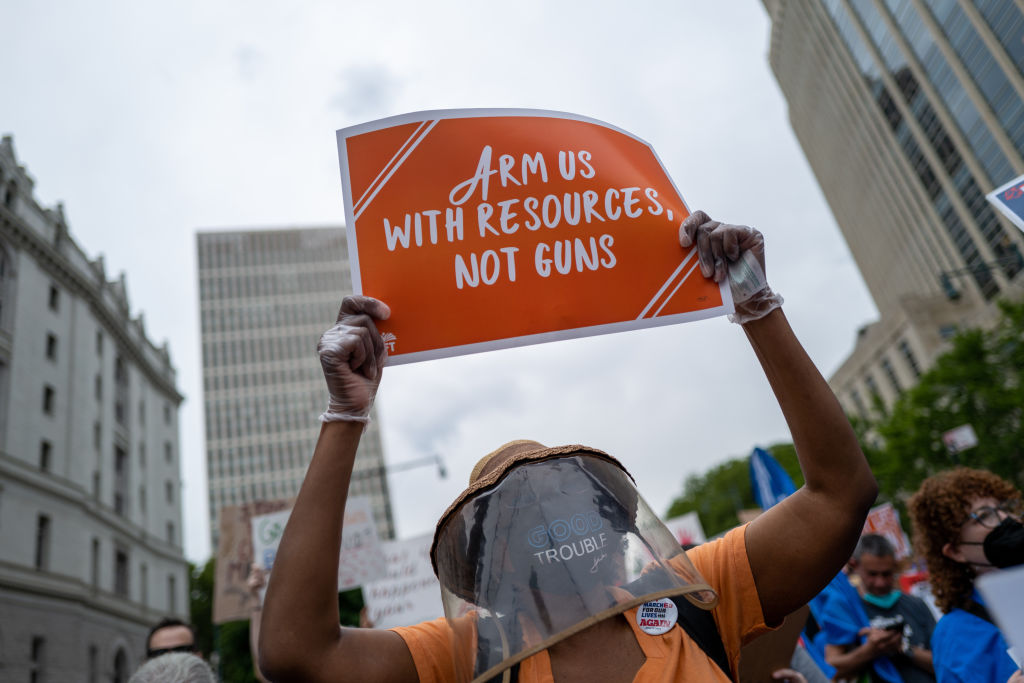Black Americans account for 60% of firearm homicides each year, report finds
The Brady Center to Prevent Gun Violence analyzed firearm mortality data from the CDC.
Black people continue to be disproportionately affected by gun violence, as they account for 60% of all firearm homicides yet make up just 14% of the population, according to a new study.
The Brady Center to Prevent Gun Violence analyzed firearm mortality data from the Centers for Disease Control and Prevention between 2017 and 2021.
Researchers found that the average firearm mortality homicide rate for Black people of all ages was 21.05 per 100,000 people, compared with 1.93 per 100,000 for non-Hispanic white people. The largest disparity was in the 18-to-24 age group, where Black people had a firearm mortality rate of 58.78 per 100,000 people, compared with 3.1 per 100,000 for white people.
“Gun violence has been a top concern for a long time in the Black community,” Kelly Sampson, senior counsel and director of racial justice at the Brady Center, told theGrio. “For people who care about the Black community, you can’t get away from these numbers. People will look at these numbers and blame the victim but we know that gun violence is preventable. It is not inevitable.”

In 2020, gun violence became the leading cause of death for all children, but it’s been the leading cause of death for Black children since 2006, according to the Brady analysis. Firearm suicide rates are also growing at a rapid pace among Black people, increasing by 50.8% over the past five years.
In addition, Black people are killed 2.7 times more than white people by the police and are 27% of people shot and killed by the police since 2015, the report showed. “There’s been a lot of research on the implicit bias works in terms of policing. That has to do with the way Black people are seen,” Sampson said.
People who live in communities affected by gun violence tend to be the ones who step up and do the work to address it. “People care about all of it. It doesn’t matter where the bullet is coming from, if it takes your child away, you’re going to care about it,” Sampson said.
That’s how LaChelle Rice looks at the problem. In 2013, her oldest son, Jerrel Key, was shot and killed in Baltimore in an armed robbery. Ten years later, her youngest son, Jerron Key, was killed after getting caught in the crossfire of a shooting.
Rice does community outreach work with Moms Demand Action in Baltimore, which is part of Everytown for Gun Safety, another national gun violence prevention nonprofit.
Recommended Stories
“I think we’re starting to really hear from the communities where (gun violence is) happening. We’re tired of the violence,” Rice said, adding that she believes there’s been a shift in how the issue is discussed today. “It’s reported from the impact that it is having on the individual person. All of the attention is not on the perpetrator. It’s reported on how it has affected the community, the home, and the family.”
She contended that the decision-makers in cities that struggle need to do a better job of providing resources to the areas that need them the most. “Many of those who are in power don’t want to admit that there needs to be better education, there needs to be better resources available for families,” Rice said.
Even with the tragedy her family has faced, Rice said she believes things will get better at some point. “This isn’t something that happened overnight, so it’s going to take time,” Rice said. “I don’t give up hope that things will change.”
Never miss a beat: Get our daily stories straight to your inbox with theGrio’s newsletter.
More About:News









